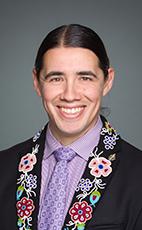[Member spoke in Cree, interpreted as follows:]
Mr. Speaker, I am very thankful to have the opportunity to speak about the tremendous contributions made to Canada by those of Dutch heritage and the incredible sacrifices made by Canadians in the liberation of the Netherlands. What might surprise people is the fact that many indigenous people contributed to this liberation. One might not think that there is much of a link between indigenous people and Dutch people, but there definitely is.
In the Second World War as a whole, more than 200 indigenous soldiers lost their lives. Indigenous soldiers earned a minimum of 18 decorations for bravery in action. They participated in every major battle and campaign, from the disastrous Dieppe landings to the pivotal Normandy invasion and the Battle of Hong Kong, where 2,000 members of the Winnipeg Grenadiers and the Royal Rifles of Canada became prisoners of war of the Japanese. At least 16 of those prisoners were first nations people and Métis. In September 1944, only three months after D-Day, Canadians began the campaign that would liberate the Netherlands from Nazi occupation.
As I mentioned previously, some of these brave soldiers were indigenous and gave their all for the freedom that Dutch people deserved. I would like to highlight Saskatchewan's David Greyeyes, originally a grain farmer from the Muskeg Lake Cree band. He began his service in Great Britain, giving advanced weaponry training to reinforcements. He served in Italy, France, Belgium and, of course, the Netherlands.
Another noteworthy soldier was Charles Byce, who was the only member of his regiment, the Lake Superior Regiment, to earn both the Distinguished Conduct Medal and the Military Medal. He was the son of Louisa Saylors, a Cree from Moose Factory, Ontario. Byce earned his first decoration for valour, the MM, in the Netherlands in January 1945. The story behind this award is quite amazing.
These brave men are all heroes to all Canadians. I cannot thank them enough for their hard work in keeping our country safe. As the relationship between Canadians and those of Dutch heritage grows deeper, let us not forget the contributions indigenous people made as well for the people of the Netherlands.
I am honoured to speak in the House in support of recognizing every May 5 as Dutch heritage day to honour this unique bond between the Dutch, Canadians and indigenous people. We thank our friends of Dutch heritage for their tremendous contributions to our country. To our incredible soldiers who put their lives on the line for the freedom of the Dutch people and Canadians across the country, we are forever grateful. Again, I am thankful.

